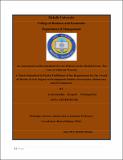| dc.description.abstract | This study attempted to investigate the An assessment on Decentralized Service Delivery in the
Health Sector in Ahferom Wereda which is one of the administrative divisions of Tigray National
Regional State. The main objectives of this study was to examine adequate human resources and
health service availabilities including pharmaceutical commodities, the local level health
service delivery arrangements in terms of accountability, the institutional capacity of local
government in implementing and coordinating decentralized health service programs and
policies and identify the challenges of decentralized governance in the process of health service
provision. The study used a descriptive survey research design and employed both qualitative
and quantitative data types, specifically semi -questionnaires, semi-structured interviews and
focus group discussion. In addition to this, study was employed both primarily and secondary
sources of data. The sampling designs used in this study are both probability and non probability
sampling designs. These are, purposive, clustered, lottery method, proportionate sampling and
finally convenience sampling was employed. For the purpose of this, the study used a sample of
190 house hold heads. In addition to this, the study used 20 key respondents purposely. The key
respondents with regard to this objective were officials in health related management and health
service providers of the wereda .The major findings of this study reveals that though
decentralization is contributing better health services availability, it constrains ensuring of
adequate human recourse, geographical accessibility and adequate pharmaceutical commodities
for better health service delivery to the public. Besides, there is failure of accountability in
relation to financial planning, reporting and implementation of activities, the availability of
channeling procedures for complaints, strong institutional capacity in terms of leadership,
human resources management and financial management capacity. In relation to the challenges
in health service delivery; shortage of sufficient and competence human racecourses, inadequate
pharmaceutical commodities, insufficient financial resources and weak leadership are identified
as the major challenges. The study recommended organizing public to participate in financing
and health service delivery, enhancing leadership and improvement, filling vacancies and
enhancing competency of the staff, strengthening standardized auditing instrument and
improving and strengthening inter-organizational relations with different NGOs are more
relevant. | en_GB |


